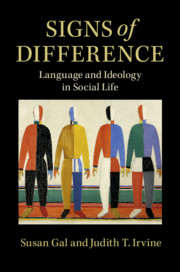Book contents
- Signs of Difference
- Signs of Difference
- Copyright page
- Contents
- Figures
- Tables
- Acknowledgments
- Introduction
- Part I Ethnography
- Part II Semiotics
- 3 Ingredients: Signs, Conjectures, Perspectives
- 4 Comparison: The Semiotics of Differentiation
- 5 Dynamics of Change in Differentiation
- Part III Sites
- Part IV Pasts
- Notes
- References
- Index
4 - Comparison: The Semiotics of Differentiation
from Part II - Semiotics
Published online by Cambridge University Press: 17 June 2019
- Signs of Difference
- Signs of Difference
- Copyright page
- Contents
- Figures
- Tables
- Acknowledgments
- Introduction
- Part I Ethnography
- Part II Semiotics
- 3 Ingredients: Signs, Conjectures, Perspectives
- 4 Comparison: The Semiotics of Differentiation
- 5 Dynamics of Change in Differentiation
- Part III Sites
- Part IV Pasts
- Notes
- References
- Index
Summary
The chapter explicates comparison, a way of reasoning with signs that produces differentiation. It shows differentiation step-by-step with examples from a nineteenth-century American traveler describing people, practices, interactions, and landscape. Her presuppositions of what merited attention drew on frameworks of geography, society, linguistics, and politics. The qualities picked out by frameworks, organized into comparisons, constitute axes of differentiation. Diagrammatic iconicity provides semiotic scaffolding for axes. She understood her world as clusters of complementary qualities: “east” and “west.” Through rhematization, qualitative differences between signs seem like parallel differences in their objects; master metaphors summarize similarities among ontologically distinct phenomena as produced by differentiation. Narratives claim to explain the differences axes project. Fractal recursivity creates, by analogy, many differences from a single axis. Multiple axes may operate in a social scene. East/west is one axis in this historical example, standardization another. They have different topological shapes. Erasure simplifies this totalizing differentiation.
- Type
- Chapter
- Information
- Signs of DifferenceLanguage and Ideology in Social Life, pp. 112 - 137Publisher: Cambridge University PressPrint publication year: 2019



